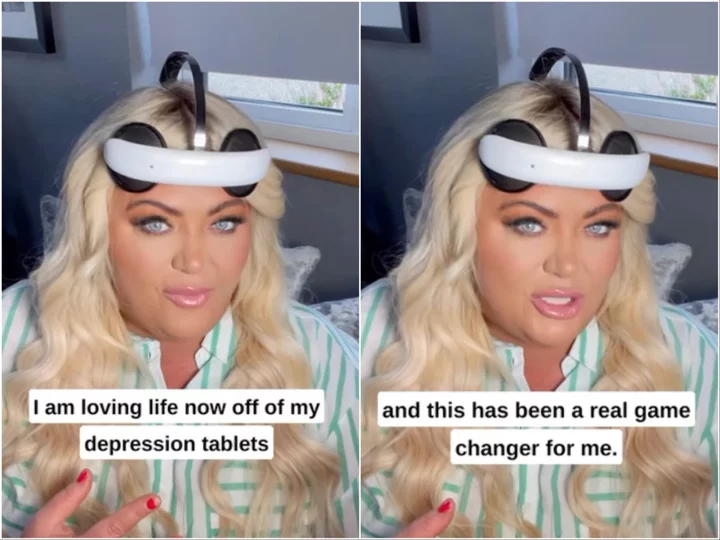
‘Covid killed my taste buds – then my business’
A cooking teacher who lost her sense of taste and smell and “never fully recovered” after catching Covid last summer has decided to shut her business because she can no longer gauge the quantity needed or quality of ingredients in her dishes. Raisa Ali, 51, said to continue teaching people how to cook Indian food would be like “the blind leading the blind” as her sense of taste and smell have never been the same since she caught Covid in July 2022. The mother-of-three, who lives in Kingston, south London, knew “something was missing” after her husband Akbar, 52, and her students found she was being heavy-handed with the spices but could not tell the difference. Raisa made the difficult decision to close her Sweet Sultry Spice cooking school after teaching a class how to make the Indian spice mix garam masala and realising that, while she knew the recipe from memory, she could not smell the pungent ingredients. Covid has “killed the joy of cooking” and dried up her source of income, but Raisa has now accepted what happened and is looking for a fresh start. Raisa, who has three sons, twins Zain and Zakir, 16, and Yusuf, 19, said: “I can’t dwell on this anymore and just have to move forward. “My main mode of cooking and learning and teaching has been to follow my nose. “I used to make my students take whiffs of everything at every stage. “I decided to close the school because when I lost my sense of taste and smell, my passion died. “Covid killed the most important part of food for me.” Raisa started giving cooking classes in her kitchen after completing a nutrition course in 2018 and taking advice from a friend. “I did a one-year nutrition course and started working online, trying to build a small business, but it wasn’t going anywhere and I was feeling very isolated,” she said. “A friend of mine came over and said ‘you’re doing it all wrong, why don’t you just open a cooking school’. “I was scared but she was like ‘feel the fear and just do it anyway.” She soon found herself giving two or three classes per week to groups of around five people for between £60 and £70, teaching them to cook Indian cuisine. “People would come over to my house and they wouldn’t leave – it was great,” said Raisa who moved to the UK in 2008 after her husband was transferred to the country for work. “It was a really great experience and then when it went away, I just thought now what am I going to do?” Just when her budding business started taking off, bringing in between £500 and £800 per month, Covid struck. “Suddenly Covid’s happening and from one day to the next the business totally died,” she said. “The income that I had was gone and everything that I had built was gone. “I spent that first year (2020) feeling sorry for myself.” Then while travelling back to her native California, in July 2022, Raisa caught Covid and spent two weeks in bed. “I spent the first two weeks in bed and then started to recover slowly,” she said. “When I came back, I had brain fog, I couldn’t smell things properly and I couldn’t taste things properly.” She noticed her taste buds were not firing on all cylinders after eating some tortilla chips which tasted like “cardboard”. “I’m eating them and thinking, I don’t understand, what is this?” she said. “And it has just never come back properly.” While Raisa started to recover after spending two weeks in bed, some of her symptoms lingered for months. Once lockdown rules lifted, Raisa went back to giving cooking classes, but it was not the same. In January 2023, while teaching a group how to make garam masala from scratch, Raisa’s sense of smell was put to the test. “When they could smell it across the room then I knew, at that point, that this wasn’t going to work for me because it would be like the blind leading the blind,” she said. “I remember telling my customers, look I’m telling you everything from memory and my past experience because I don’t have have my sense of taste and smell. “Isn’t that depressing?” On another occasion, she was cooking a chicken dish and a student asked about the ingredients but Raisa could not “taste anything”. “It turned out it was black pepper but I couldn’t even taste it,” she said. Her husband and children also started picking up on strong flavours which appeared relatively mild to her. “I knew something was missing because when I cooked things for my husband he would say ‘oh, you put a lot of this in’,” Raisa said. “But I could not tell the difference.” Even to this day, Raisa says she has not fully recovered her sense of taste and smell. “If I would sum it up, Covid killed the joy,” she said. “I just feel like I don’t want to bother anymore because I feel like my drive is gone. “So I decided, either I can be upset about it or I can reinvent myself again.” Raisa has decided to see her Covid nightmare as a positive step towards new beginnings. “If you are cooking something, you have to be able to smell and taste the ingredients and I knew I couldn’t do that so I decided it was time for a complete shift,” she said. She has not been to see a doctor about her long-lasting symptoms as she believes there are many other people who are “far worse off” and that the NHS already has “too much on its plate”. She is now looking to explore other business opportunities which do not rely on having a sense of taste and smell. “Sustainable living” is one area in which Raisa is particularly interested, but what this will look like in practice remains to be seen. “I want to get rid of my carbon footprint,” she said. “I don’t need to prove anything to anyone, it’s just what I want to do.” For more information about next steps, follow Raisa on Instagram. Read More Covid Inquiry could see unredacted Johnson WhatsApp messages despite legal clash I decide what’s relevant, says Covid inquiry chair in Boris WhatsApp row Covid Inquiry head making ‘no comment’ on legal row over Johnson messages Charity boss speaks out over ‘traumatic’ encounter with royal aide Ukraine war’s heaviest fight rages in east - follow live
1970-01-01 08:00

Simone Inzaghi reveals Inter plan to stop Erling Haaland in Champions League final
Simone Inzaghi has discussed how Inter intend to stop Erling Haaland in the UEFA Champions League final.
1970-01-01 08:00

Gemma Collins blasted for promoting headset as ‘magic’ cure for depression
Gemma Collins has been criticised by her followers for using misleading wording in an advert for a “medication free” headset, which is apparently used to treat depression. The TV star and presenter, 42, who is best known for appearing in realty series The Only Way Is Essex, shared a video of her wearing the Flow Neuroscience Headset, telling her followers that she had been using the product for one week and was already feeling “lighter” and “brighter”. In the caption she wrote: “According to Flow’s data it reduces depression in 88 per cent of people. And the NHS are trialling it too.” She finished the caption with “#ad” to indicate that she was asked to promote the product. The Independent has contacted Collins’ representatives about the terms of the advert. In the video, Collins told the camera the product is “literally amazing”. “I am loving life now off of my depression tablets. This has been a real game changer for me,” she said. According to Flow, the headset sends a “small electrical current” to “the left dorsolateral prefrontal cortex”, which causes “neurons to fire more frequently, strengthening the neural pathways in the prefrontal cortex”. Collins continued: “Flow is a new medically approved depression treatment. It focuses on the front cortex of your brain. This ultimately helps you to relax and it also helps to remove negative depressive symptoms.” “For people that can’t get access to therapy, or don’t want to be on antidepressants, they have a new option which is Flow.” “Flow actually works faster and better than antidepressants,” she claimed in the video. “It’s like having your own therapist in the comfort your own home and you’re fully in control of your own treatment.” She concluded that using Flow would be “the best thing you do”. Social media users have been criticising Collins’ messaging in the post, arguing that she is promoting the product as a “quick fix” for depression and encouraging people to stop their medications without first consulting a medical professional. “People PLEASE speak to your medical team before stopping any medications,” one person urged in the comments section. Another pleaded to Collins: “Please don’t promote people just abruptly coming off their medication !!” Others remarked that Collins had not linked to any scientific research to support her claims, or given insight into how the product actually works. A representative for Flow Neuroscience told The Independent that it is “very clear” on its website that anyone with depression should “always speak to their doctor first before trying new treatment”. The statement continued: “At a time when society is attempting to remove the stigma associated with mental health – people like Gemma are helping enormously by being open and transparent about their own mental health journey.” “Gemma has struggled for years on antidepressants, and it’s brilliant that she is now having this positive experience using Flow.” The spokesperson added that Collins’ posts are a “reflection of her own personal experience” and the post had not been “edited or scripted” by Flow. Collins has previously said that the side effects of using antidepressants have not worked for her, which drew her to using the headset. Flow’s spokesperson also said that the company’s mission is trying to “increase accessibility” to mental health treatments. At present, the headset does not require a prescription before use and is available to purchase online. The company says that “83 per cent of its users reported improvement in their symptoms within 21 days” and that less than two per cent of its users on its database reported minor side effects, which are “typically mild irritation of the kind and mild headaches”. It added: “We believe the Flow platform is an important tool in this process, but it has never been our intent to present Flow as a quick fix or magic bullet.” Read More Prince Harry court – live: Duke of Sussex stokes political storm by slamming ‘rock bottom’ government Ioan Gruffudd’s 13-year-old daughter ‘files restraining order against him’ Busy Philipps calls out Leonardo DiCaprio for ‘dating’ model who looks like her teen daughter Gemma Collins says she wouldn’t ‘need to’ consider surrogacy Fitness fanatic, 26, diagnosed with stage 4 cancer after feeling dizzy The telltale sign of lung cancer everyone should know
1970-01-01 08:00

Kaka's perfect teammate
Kaka selects the best teammates he's ever had throughout his legendary footballing career.
1970-01-01 08:00

Expectations for Brazil's long-term inflation to start easing -cenbank chief
BRASILIA Brazil's central bank chief Roberto Campos Neto said on Monday that long-term inflation expectations, which have long
1970-01-01 08:00

Kevin De Bruyne insists Champions League final won't 'define' his career
Kevin De Bruyne has insisted that the outcome of the 2022/23 UEFA Champions League final won't define his career at Man City.
1970-01-01 08:00

Can Mike Pence woo evangelicals away from Trump?
The former vice-president was his boss's ambassador to the Christian right - he needs them to win in 2024.
1970-01-01 08:00

Twins vs. Rays prediction and odds for Tuesday, June 6 (Beware of Tampa's Offensive Struggles)
The Tampa Bay Rays had to wrap up their weekend series with the Boston Red Sox yesterday and now they don’t have a day off before getting right into this three-game series with the AL Central leading Minnesota Twins. While both teams are division leaders the Rays are in a class of their own wi...
1970-01-01 08:00

Liverpool improves midfield by landing Alexis Mac Allister
Liverpool improves midfield by landing Alexis Mac Allister
1970-01-01 08:00

Pence files paperwork to join 2024 presidential race, setting up clash with Trump
Former Vice President Mike Pence on Monday filed the paperwork for his bid for the 2024 Republican presidential nomination, setting up a clash with his running mate of elections past, former President Donald Trump.
1970-01-01 08:00

Harry Kane's stats compared to Karim Benzema
How Harry Kane's stats compare to Karim Benzema's across various competitions.
1970-01-01 08:00

World Heart Rhythm Week: Could you have an abnormal heart rhythm?
It’s believed around three million Brits have an abnormal heart rhythm or arrythmia – and many may not even realise it. The most common arrhythmia is atrial fibrillation (AF), which causes an irregular and often unusually fast heartbeat, and is associated with a five-times higher risk of having a potentially fatal or life-changing stroke. If diagnosed, AF can be treated – however, it’s estimated there are at least 270,000 people in the UK who are unaware they have the condition, according to the British Heart Foundation (BHF). “What remains troubling is the sheer number of people who are undiagnosed and unaware that they are living with a heightened risk of stroke,” says BHF medical director, Professor Sir Nilesh Samani. “Finding people with this hidden threat must remain a priority.” Trudie Lobban, founder of the Arrhythmia Alliance – a coalition of patients, healthcare professionals and policymakers, adds: “Heart rhythm disorders are a leading cause of sudden cardiac death and devastating strokes, and yet too few people are aware of the rhythm of their heart.” To mark World Heart Rhythm Week (5-11 June), experts are highlighting the importance of being aware of arrhythmia warning signs and getting things checked out. Here’s what you need to know… Arrhythmias can affect all age groupsHowever, AF is most common in older age groups. As Dr Anthony Chow, a consultant cardiologist at The Wellington Hospital, part of HCA Healthcare UK, explains: “Heart rhythm problems are a very common condition that can affect all age groups, but AF is more common in older people. It can be as common as 10% of the population in their 70s, and almost 29% of those in their 80s.” Arrhythmias can have many causes Lobban says many conditions can cause heart rhythm problems, including heart failure, blackouts, electrolyte disturbances, thyroid disorders, infections, heart attacks, strokes, cardiomyopathy, high blood pressure, sleep apnoea and obesity. Triggers can also include stress, caffeine, tobacco, alcohol, diet pills, and cough or cold medicines. “But there is usually an underlying physical reason for it,” Lobban adds. Warning signs to look out for Key warning signs, says Chow, are palpations (a thumping or fluttering sensation in your heart/chest), dizzy spells and feeling faint, breathlessness, chest discomfort, and feeling overly tired. These things don’t automatically mean you have a heart problem, but it’s important to get any symptoms checked out. And Chow adds: “Not everyone experiences these exact symptoms and, in some cases, patients can experience no symptoms at all.” How to measure your heart rhythmThere are many ways heart rhythms can be measured clinically, through ECGs or monitors. You can check your pulse yourself at home, too. “The easiest way to detect an arrhythmia is to feel your pulse and hence your heart rhythm – is it irregular, too fast, or too slow?” says Lobban. “Such a simple thing as a 30-second pulse rhythm check can literally save your life.” The Heart Rhythm Alliance has a ‘know your pulse’ guide on their website. Lobban says you should sit down for five minutes beforehand, and remember that any stimulants you’ve taken, like caffeine or nicotine, will affect the rate. You’ll need a watch that measures seconds (take it off to do the test), or your phone timer could work. Hold your left or right hand out with your palm facing up and elbow slightly bent. With your other hand, place your index and middle fingers on your wrist near the base of your thumb, between the bone and stringy thumb tendon, to find your pulse. Once you’ve found your pulse, maintain a firm pressure and count the beats for 30 seconds, then multiply by two to get your heart rate in beats per minute. If your heart rhythm is irregular, you should count for one minute and don’t multiply. Arrhythmia can cause many serious health problemsHeart arrhythmia can cause a variety of serious heart health complications including strokes, heart failure and heart attacks, explains Chow. “Heart arrhythmias, in particular AF, are often associated with an increased risk of blood clots, so it’s extremely important to be aware of the warning signs,” he says. “If a blood clot breaks loose, it can travel directly from the heart to the brain, which can cause a stroke. You should consult your doctor and get referred to a cardiac rhythm specialist for assessment if you have significant symptoms.” When to see a doctor If you have any previous history of heart problems and/or are becoming increasingly concerned about palpations, you should speak to a medical expert, Chow advises. Those with a family history of arrythmia and/or sudden cardiac death should also make sure they get checked out. “It’s not usual that we’re aware of our heart beating, unless there’s a disturbed rhythm,” he says. “You should speak to your doctor if your heart palpations are lasting a long time, or aren’t improving and seem to be getting worse. Acute instances of symptoms could be a warning sign of something more serious, so it’s important to seek medical advice if you’re concerned. In some cases, arrhythmia could be an indication of a medical emergency such as a heart attack.” Treatment for arrhythmiaArrhythmias can be treated in a variety of ways. “Some require no more than reassurance after diagnosis, but others may need drug therapy, or implantation of an electrical device such as a pacemaker or ICD,” says Lobban. Chow says therapies such as cardioversion can be used to reset the heart rhythm by sending a shock through the chest to the heart, and there are also procedures and surgeries including catheter ablation, where wires are threaded through blood vessels directly to the heart and heat is used to create tiny scars in the heart to block abnormal electrical signs and restore a normal heartbeat. Chow adds: “Most people with abnormal heart rhythms can lead a normal life when the condition has been properly diagnosed and managed.”
1970-01-01 08:00
